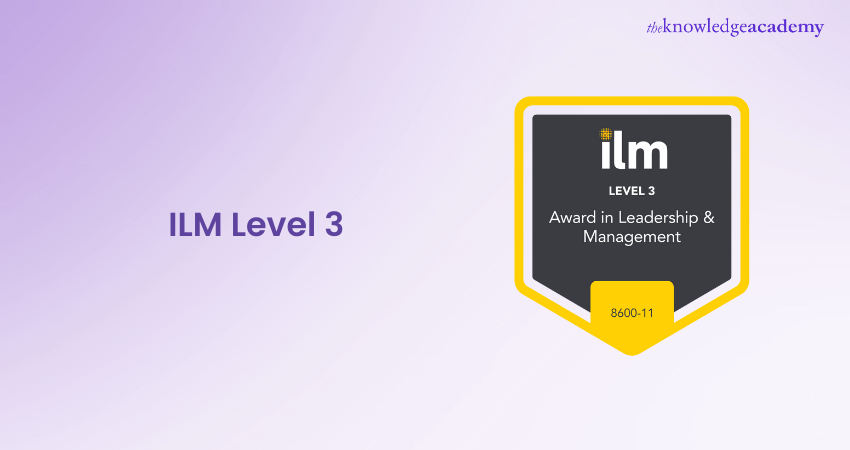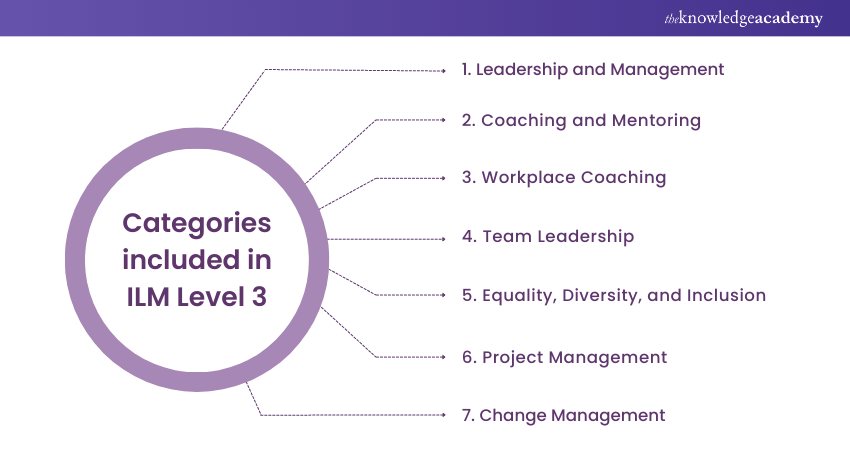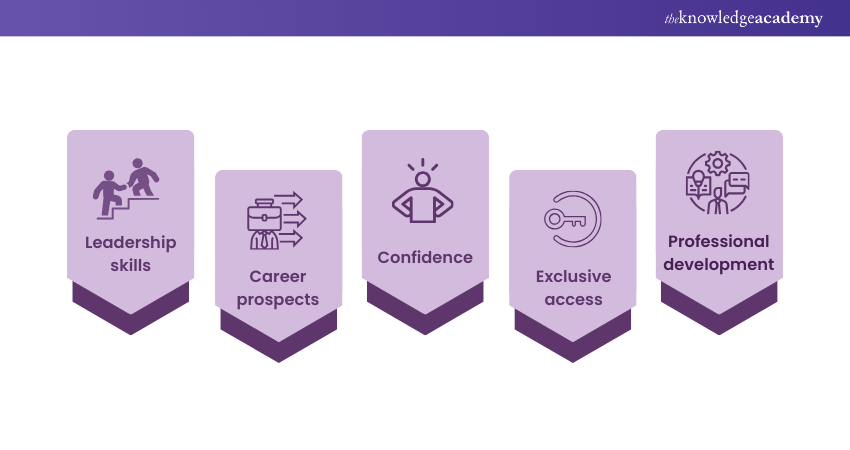We may not have the course you’re looking for. If you enquire or give us a call on + 1-866 272 8822 and speak to our training experts, we may still be able to help with your training requirements.
Training Outcomes Within Your Budget!
We ensure quality, budget-alignment, and timely delivery by our expert instructors.

If you want to upskill your leadership skills and progress in your career, the ILM Level 3 qualification is an excellent option. Designed to equip aspirants with the necessary skills, expertise and knowledge to manage teams, processes and projects effectively, the Institute of Leadership and Management (ILM) Level 3 qualification is highly respected worldwide.
According to the ILM site, 86% of employers say that they have seen an improvement in their managers' skills after completing an ILM qualification. In addition, 93% of learners say that an ILM qualification has positively impacted their career.
In this blog, we will understand in detail about What is ILM Level 3, the certifications related to ILM Level 3, and the benefits you can expect after obtaining the qualifications. Read ahead to learn more!
Table of Contents
1) What is ILM Level 3?
2) Qualifications under ILM Level 3
a) ILM Level 3 Award in Leadership and Management
b) ILM Level 3 Award in Effective Coaching
c) ILM Level 3 Certificate in Leadership and Management
d) ILM Level 3 Certificate in Principles of Leadership and Management
e) ILM Level 3 Certificate in Effective Coaching
f) ILM Level 3 Diploma in Leadership and Management
3) Benefits of completing ILM Level 3
4) Conclusion
What is ILM Level 3?
ILM Level 3 refers to a specific level of qualifications offered by the Institute of Leadership and Management in the UK. This level of qualification is aimed at individuals who aspire to be in a middle management role. The ILM Level 3 qualification is designed to provide candidates and aspirants with the skills, knowledge and expertise required to be an effective middle manager.
The common skills that can be mastered after the completion of ILM Level 3 are:
a) Leadership
b) Communication
c) Decision-making
d) People Management
e) Resource Management
f) Information Management
The categories that are included in ILM Level 3 are:
1) Leadership and Management: This category focuses on middle management level leadership and management skill development. It includes topics such as administration of teams, performance evaluation, decision-making, problem-solving, and leadership styles.
2) Coaching and Mentoring: This category is intended for people interested in using coaching and mentoring as a management and leadership tool. It discusses the foundational ideas and methods of coaching and mentoring, such as how to build strong coaching and mentoring bonds and how to apply these methods to promote the growth of others.
3) Workplace Coaching: This category is dedicated to workplace coaching abilities. It addresses issues like coaching methods, coaching interactions, feedback, and coaching-assisted performance development.
4) Team Leadership: This category is intended for people who either already hold a team leader position or aspire to hold one soon. It addresses issues including team dynamics, interpersonal communication, team performance management, and how to inspire and lead a team.
5) Equality, Diversity, and Inclusion: This category is focused on advancing workplace inclusion, diversity, and equality. It addresses topics like appreciating diversity, managing diversity, encouraging inclusivity, and fostering a supportive and welcoming workplace.
6) Project Management: This category is intended for individuals who aspire to be involved in Project Management roles. It covers project planning, risk management, project monitoring and control, and project leadership.
7) Change Management: This category is focused on managing change within organisations. It covers topics such as change management principles, change models, stakeholder engagement, and communication during times of change.
Gain practical skills and knowledge to become an effective leader and propel your career forward with the ILM Level 3 Certificate in Principles of Leadership and Management Course Sign up now!

In terms of career progression, achieving an ILM Level 3 qualification can help individuals move into a more senior role and gain noteworthy recognition for their management skills and knowledge. It can also provide a stable foundation for further study and development in management, including the ILM Level 5 qualification. Overall, the ILM Level 3 qualification is a valuable asset for aspirants looking to build their leadership and resource management careers.

Qualifications under ILM Level 3
Listed below are the various qualifications aspirants can obtain under ILM Level 3:
1) ILM Level 3 Award in Leadership and Management
The qualification equips learners with the essential skills and expertise to become effective leaders and managers in their respective organisations. The course is designed for individuals with management and supervision experience who want to develop their leadership skills further. It is also applicable for those who have recently been promoted into a management role.
The course is flexible and can be completed through different learning modes, including classroom-based, distance, and blended training. This qualification is divided into three broad modules:
a) Understanding Leadership: This unit explores the principles of effective leadership, different leadership styles, and their impact on teams and individuals.
b) Develop yourself as a Leader: This unit helps learners develop their leadership skills and understand their strengths and weaknesses as leaders.
c) Understanding the communication process in the workplace: This unit explores the importance of effective communication in the workplace and the different types of communication that can be used to achieve organisational objectives.
Unlock your leadership potential with the ILM Level 3 Award in Leadership and Management - Enlist now!
2) ILM Level 3 Award in Effective Coaching
The ILM Level 3 Award in Effective Coaching is a certification program offered by the Institute of Leadership and Management. his award is designed to provide learners with a comprehensive understanding of coaching principles and practices and equip them with the skills to become effective coaches. It is suitable for individuals who wish to develop their skills in a professional and personal capacity. This may include managers, team leaders, HR professionals, team leaders or anyone interested in coaching as a career or for personal development.
The course is divided into three broad modules:
a) Understanding good practice in Coaching in a Workplace: This unit explores coaching and its benefits in the workplace. Learners will gain an understanding of coaching models, coaching techniques and the role of the coach.
b) Undertaking an Extended Period of Coaching in a Workplace: This unit focuses on the practical application of coaching in the workplace. Learners will develop their coaching skills through practice and learn how to establish coach and mentoring relationships.
c) Reflecting on Coaching Skills in a Workplace: This unit is a revision unit, where learners will develop the practice of putting the two modules they learnt earlier into action. The education from this module is primarily received through feedback.
3) ILM Level 3 Certificate in Leadership and Management
This qualification provides learners with the skills, knowledge, and understanding required to lead projects and teams effectively. It is designed for new and aspiring team leaders and managers who want to develop their leadership and management skills and progress in their careers.
The Certificate in Leadership and Management is a vertical progression from the Award in Leadership and Management and sees an increase in the number of modules. The Certificate in Leadership and Management has four mandatory modules:
a) Understanding leadership: This unit covers the different leadership styles, the qualities and skills of effective leaders, and the importance of leadership in achieving organisational objectives.
b) Understanding how to motivate and improve performance: This unit covers theories and practices of motivation and how to set objectives and goals in a workplace. In addition, it covers how to provide feedback effectively and manage individual performance in a team.
c) Understanding how to lead effective teams: This unit covers the characteristics of effective teams, how to build and maintain team cohesion, how to delegate tasks, and how to manage conflict.
d) Understanding how to manage projects: This unit covers the stages of Project Management and the tools and techniques used in Project Management. It also covers the importance of monitoring and evaluating project outcomes.
These modules are to be successfully completed to obtain the certificate, and learners will be assessed through assignments, case studies, and workplace evidence.
Gain practical skills and knowledge to become an effective leader and propel your career forward with the ILM Level 3 Certificate in Leadership and Management! Sign up now!
4) ILM Level 3 Certificate in Principles of Leadership and Management
It is a professionally recognised qualification. It is designed to help aspirants develop the knowledge and skills necessary to become effective leaders and managers. The Institute of Leadership and Management recognises the certificate as suitable for individuals who are looking to progress to a senior management role and who must face many leadership conflicts.
The course is designed to help individuals understand the key concepts of leadership and management and how to apply them in their workplace environment. The Certificate in Principles of Leadership and Management has two mandatory modules:
a) Understanding Leadership: This unit covers the expertise that effective leaders require, the different leadership styles individuals can adopt, and the need for leadership in a workplace environment.
b) Understanding Performance Management: This unit focuses on leaders organically getting the best out of their subordinates using the principles and concepts they have learnt. It is both theoretical and practical and focuses on organisational and individual objectives.
There are also five optional modules, listed as follows:
a) Managing Conflict in the Workplace
b) Understanding Recruitment and Selection of new staff
c) Managing Workplace Projects
d) Managing Workplace Stress
e) Managing Workplace Health and Safety
5) ILM Level 3 Certificate in Effective Coaching
The ILM Level 3 Certificate in Effective Coaching is a highly recognised qualification that provides learners and aspirants with the knowledge, tools and expertise to become effective coaches. The course is designed for individuals who are looking to develop their coaching skills and improve their ability to motivate, inspire and support others.
This certificate is a comprehensive program covering various coaching techniques, theories, and methodologies. It is suitable for people who are new to coaching and those who have some experience and want to develop their skills further. The certificate consists of a combination of online learning and face-to-face workshops. The ILM Level 3 Certificate in Effective Coaching comprises three mandatory modules:
a) Understanding Good Practice in Workplace Coaching: This unit introduces coaching in the workplace and the skills, tools, and techniques required to be an effective coach. It covers the different coaching models, approaches and their benefits, as well as the importance of ethics and confidentiality in coaching.
b) Undertaking Coaching in the Workplace: This unit covers the practical aspects of coaching in the workplace, including how to identify coaching needs, set coaching objectives, and design and deliver coaching sessions. It also covers the use of questioning and feedback techniques to help coaches develop their skills and achieve goals.
c) Reflecting on Coaching Skills: This unit focuses on developing the coach's self-awareness and reflective skills. It covers how to use feedback and self-reflection to improve coaching practice and how to develop a personal action plan for ongoing development.
Additionally, there is one optional module that learners are free to choose from:
Coaching for Team Performance: This unit focuses on coaching teams to improve performance. It also includes how to identify team coaching needs, design team coaching sessions, and manage the dynamics of a team coaching session.
6) ILM Level 3 Diploma in Leadership and Management
The ILM Level 3 Diploma in Leadership and Management is a highly recognised qualification that provides learners with the knowledge, skills and expertise required to become an effective leader. It is aimed at individuals who are either new to leadership or management roles or have minor experience but want to hone their skills further.
The diploma is also suitable for individuals who want to gain a formal qualification in leadership and management. The ILM Level 3 Diploma in Leadership and Management is made up of five mandatory modules, listed as follows:
1) Understanding Leadership: This unit gives learners an overview of different leadership styles and the qualities required to become an effective leader.
2) Understand how to Manage Performance: This unit focuses on developing learners' skills in setting and achieving goals, managing performance, and providing feedback to team members.
3) Understand how to Motivate and Improve Performance: This unit covers the key principles of motivation and explores different techniques for improving team performance.
4) Understanding Change Management: This unit helps learners understand the stages of change, the impact of change on individuals and teams, and how to manage change effectively.
5) Understand how to Develop and Implement a Successful Business Plan: This unit teaches learners how to develop and implement a business plan. It includes identifying business goals, creating a strategy, and monitoring progress.
There are six optional modules included in the diploma, listed below:
a) Understanding Conflict Management
b) Understanding Customer Service Standards and Requirements
c) Understanding the Principles of Marketing
d) Understanding Project Management
e) Understanding Recruitment and Selection of Staff
f) Understanding Health and Safety in the Workplace
Get comprehensive training and support to become a successful leader and achieve your career goals with ILM Level 3 Diploma in Leadership and Management! Enlist now!
Benefits of completing ILM Level 3

Here are the key benefits of completing ILM Level 3:
a) Enhanced leadership and management skills: The ILM Level 3 qualification is designed to help you develop and enhance your leadership and management skills, which are essential for success for any professional role. You will learn how to inspire and motivate your team, coach the technical aspects needed in any role, and effectively communicate with stakeholders.
b) Improved career prospects: Completing the ILM Level 3 qualification can significantly enhance your career prospects in the field you are employed. Employers highly respect the qualification and can help you stand out from other aspirants when applying for jobs or seeking promotion.
c) Increased confidence and self-awareness: The qualification involves various activities, workshops and assessments that will help you better understand yourself and your leadership skills. The boost in self-awareness can help improve your ability to lead and manage projects and teams more effectively and efficiently.
d) Access to professional networks: Completing the qualification can provide access to an exclusive professional network of other leaders and managers who have completed the same courses. This network can be valuable support and advice throughout your career.
e) Professional and personal development: The ILM Level 3 qualification is not just about enhancing your leadership and interpersonal skills. It also provides an opportunity for personal and professional development. The expertise and confidence you acquire during the course can be applied in many different areas of your life, not just in a professional context.
Conclusion
In this blog, we have learnt What is ILM Level 3, the benefits of possessing the qualification, and explored in detail the variety of qualifications the institute offers. ILM Level 3 offers learners an opportunity to advance their careers, improve interpersonal skills and allows them access to exclusive networks that will be a valuable source of support throughout their careers.
In addition, ILM 3 offers a variety of awards, certificates and diplomas to help aspirants who have moved into a management role or are looking to move into one. The global outreach of the Institute of Leadership and Management has encouraged employers to pick candidates who possess the qualification over those who don’t.
Develop highly coveted leadership and management skills with ILM Level 3! Sign up now and beat the rush!
Frequently Asked Questions
Upcoming ILM, CMI Leadership & Management Resources Batches & Dates
Date
 ILM Level 3 Award in Leadership and Management
ILM Level 3 Award in Leadership and Management
Fri 17th Jan 2025
Fri 21st Feb 2025
Fri 4th Apr 2025
Fri 6th Jun 2025
Fri 8th Aug 2025
Fri 10th Oct 2025
Fri 26th Dec 2025







 Top Rated Course
Top Rated Course


 If you wish to make any changes to your course, please
If you wish to make any changes to your course, please


